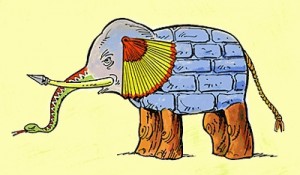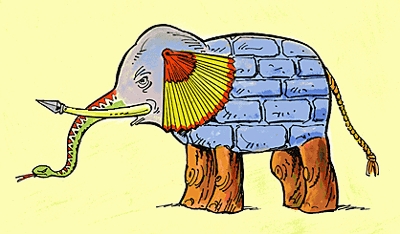A buzz word that I have been hearing in the recent weeks has been ‘mental model’. So what are mental models?
Simple, mental models are deeply ingrained assumptions or generalizations that influence how we understand the world and how we take action. The mental models that we have established are often the greatest barriers to trying new things.

The poem of ‘The Blind Men and the Elephant’ expresses this concept best. American poet John Godfrey Saxe (1816-1887) based this poem, on a fable that was told in India many years ago.
It was six men of Indostan
To learning much inclined,
Who went to see the Elephant
(Though all of them were blind),
That each by observation
Might satisfy his mind
The First approached the Elephant,
And happening to fall
Against his broad and sturdy side,
At once began to bawl:
“God bless me! but the Elephant
Is very like a wall!”
The first blind man of six blind men feels the side of the elephant and interprets it as a wall.
The Second, feeling of the tusk,
Cried, “Ho! what have we here
So very round and smooth and sharp?
To me ’tis mighty clear
This wonder of an Elephant
Is very like a spear!”
The second blind man of the six blind men feels an elephant tusk and interprets the elephant to be like a spear.
The Third approached the animal,
And happening to take
The squirming trunk within his hands,
Thus boldly up and spake:
“I see,” quoth he, “the Elephant
Is very like a snake!”
The third blind man of the six blind men touches the elephant’s trunk and interprets it to be a snake.
The Fourth reached out an eager hand,
And felt about the knee.
“What most this wondrous beast is like
Is mighty plain,” quoth he;
” ‘Tis clear enough the Elephant
Is very like a tree!”
The fourth blind man of the six blind men touches the elephant’s leg and mentally visualizes it to be a tree.
The Fifth, who chanced to touch the ear,
Said: “E’en the blindest man
Can tell what this resembles most;
Deny the fact who can
This marvel of an Elephant
Is very like a fan!”
The fifth blind man of the six blind men touches the elephant’s ear and imagines it to be a fan.
The Sixth no sooner had begun
About the beast to grope,
Than, seizing on the swinging tail
That fell within his scope,
“I see,” quoth he, “the Elephant
Is very like a rope!”
The sixth blind man of the six blind men touches the elephant’s ear and interprets it to be a fan.
And so these men of Indostan
Disputed loud and long,
Each in his own opinion
Exceeding stiff and strong,
Though each was partly in the right,
And all were in the wrong!
———————————-
Assumptions is the word most often used to refer to mental models. Even though we should not base our actions on assumptions, nonetheless, we use them to make sense of our complex world.
It is safe to say that our mental model may not be totally accurate because they are there based on personal filters of our own personal experience, so therefore are prone to be flawed. Over all though, our mental models serve us well.
Mental models are like puzzle pieces that we need to fit together into a larger whole and affect how we see as well as react to different situations. This also reinforces our own behavior. Understanding the difference between what we believe to be true and what is actually true, allows us to balance between our mental models and current reality.
It is crucial to our own self development and appreciation of the greater picture to question our mental model.
Taking a pro-active approach to developing our skills of reflecting and asking questions:
• “What are my beliefs based on?”
• “Do I have any proof to question any evidence to my beliefs?”
• “Am I willing to consider the possibility that my beliefs may be inaccurate?”
Daisy Says: Changing your assumptions will change your attitude.


“If you only have a hammer, you tend to see every problem as a nail.” (Abraham Maslow)
(((((HUGS)))))
That’s is very true ,may bee many people don’t change the attitude because they don’t want take a chance to fail but, what they don’t realize that this attitude take away the great opportunity to gain a lot and if we don’t take the risk like and opportunity for have a good change, how we can know for sure the results.WE need to belive that any chance of change holds the possibility of a miracle.